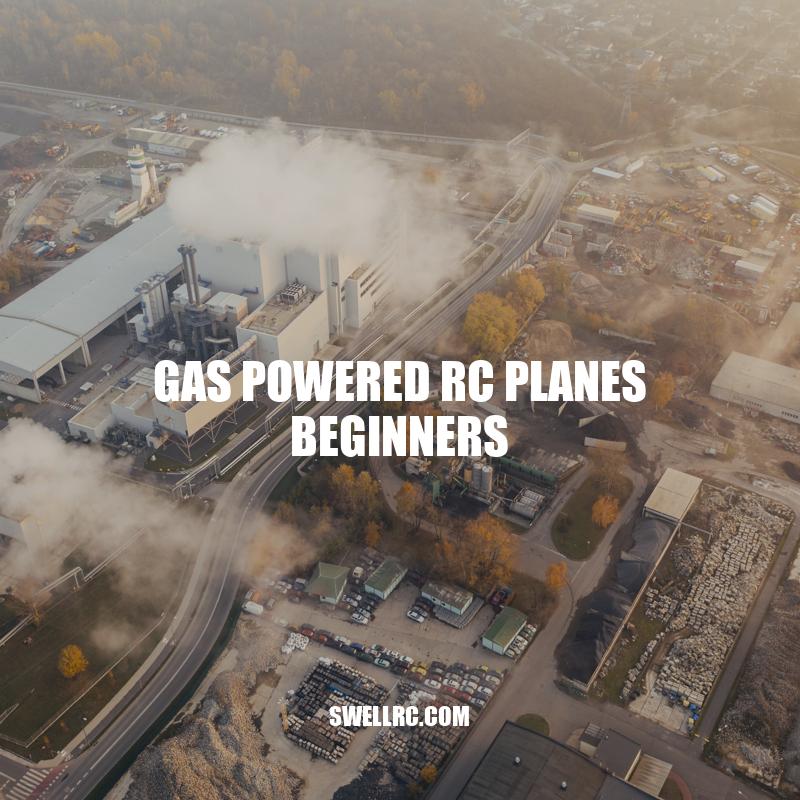Gas Powered RC Planes: A Beginner’s Guide
Remote Control (RC) planes are a popular hobby among aviation enthusiasts, offering a thrilling combination of flight and technology. With advancements in engineering, electric-powered planes have become the norm among hobbyists over the years. However, gas-powered models are still a top choice for many experienced pilots due to longer flight times, greater power, and speed capabilities. While gas-powered planes may seem intimidating to beginners, they can be an excellent option for those seeking to take their passion for flying to the next level. In this article, we’ll provide an overview of gas-powered RC planes for beginners, their benefits compared to electric models, how to select the right one, basic building and flying tips, safety considerations, and maintenance and upkeep tasks to help you get started with this exciting hobby.
Gas powered RC planes offer several advantages over their electric counterparts. Here are a few reasons why beginners should consider investing in a gas-powered remote control plane:
- Longer flight times – Gas engines can provide up to 30 to 45 minutes of flight time on a single tank of fuel, compared to 10 to 15 minutes with electric-powered planes.
- Greater power and speed capabilities – Gas-powered engines can offer more power and speed than electric motors, making them ideal for aerobatic maneuvers and flying in windy conditions.
- Easier to maintain in the long run – Gas engines require fewer replacement parts and maintenance tasks, resulting in lower costs in the long run.
Keep in mind that gas-powered planes also involve more maintenance and preparation work compared to electric models. However, many hobbyists consider it a fair exchange for the extended flight times and higher performance.
Interested beginners can check out some of the popular gas-powered planes available in the market, such as the Boss Cat or the Extra 260 35%. Several online articles offer tips and tricks to make the transition to gas-powered planes smoother for beginners.
What are the advantages of RC planes?
RC planes, or remote-controlled planes, offer many advantages to hobbyists and enthusiasts alike. Here are some of the main benefits of RC planes:
| Advantages of RC planes |
|---|
| Ability to fly in remote or hard-to-reach areas |
| Opportunity to learn about aerodynamics and physics |
| Wide range of models to choose from, including replicas of real planes |
| Improved technology allows for easier control and longer flight times |
| Can be a fun social activity with clubs and competitions |
For those interested in getting started with RC planes, there are plenty of resources available online. Websites like rcplanet.com and horizonhobby.com offer a wide range of models and accessories, as well as articles and tutorials for beginners. Additionally, YouTube channels like Flite Test provide entertaining and informative videos on all aspects of RC plane flying.
As a beginner, there are several factors to consider when choosing a gas-powered plane model. Here are some things to keep in mind:
- Wingspan – A larger wingspan means more lift and stability, but also a larger and heavier plane.
- Size and weight – Consider your storage and transportation options when choosing a plane. Smaller planes may be easier to handle, but they might also be more difficult to see from a distance.
- Fuel type – There are different types of gas fuel available, such as gasoline, methanol, and oil. Check your plane’s instruction manual to see which fuel type is recommended for optimal performance.
- Price – Gas-powered planes can range from a few hundred to thousands of dollars. A basic model can be a good starting point for beginners who want to test the waters before investing more.
Below is a table comparing some popular beginners’ gas-powered RC planes:
| Model | Price (approx.) | Wingspan | Fuel Type |
|---|---|---|---|
| Sig Kadet LT-40 | $250 | 70 in | Glow Fuel |
| Hanger 9 Ultra Stick 30cc ARF | $500 | 81 in | Gasoline |
| Great Planes Giant Big Stik | $700 | 80 in | Gasoline |
Keep in mind that the best gas-powered RC plane for you depends on your experience level, flying preferences, and budget. Research and review several models before making a purchase.
How do I choose the right motor for my RC plane?
Choosing the right motor for your RC plane is crucial for its performance. Here are some factors to consider:
1. Weight of the Plane: The weight of your RC plane will determine the type of motor it needs. Heavier planes require more powerful motors.
2. Wingspan: The wingspan of your plane is another important factor. Longer wingspans require more powerful motors to maintain flight.
3. Battery: The size and weight of the battery used also affects the size of the motor required. Ensure that the motor is compatible with the battery you plan to use.
4. Propeller: The size and pitch of the propeller used must be matched to the motor chosen. This ensures optimal performance and efficient power consumption.
To make the right choice for your RC plane motor, it is recommended to use online calculators and resources such as MotionRC.com or HobbyKing.com, which provide a wide range of motors and specifications to help you make an informed decision.
Moreover, there are notable websites such as RCGroups.com and RCTech.com which features community forums that can provide useful tips and recommendations.
Overall, careful consideration of the factors mentioned above will guide you to select the ideal motor for your RC plane.
| Website | Description |
|---|---|
| MotionRC.com | Provides a variety of motors and batteries, along with a motor selection calculator to aid in choosing the right one. |
| HobbyKing.com | Offers a wide range of motors, batteries, and propellers, as well as online calculators for selecting the ideal motor for your plane. |
- RCGroups.com: A community forum that features useful discussions about various types of motors, planes, and DIY upgrades.
- RCTech.net: A popular forum where you can find information about different types of motors and planes, along with recommendations from experienced hobbyists.
Building and Flying Gas Powered RC Planes:
Gas powered RC planes can be a fun and rewarding experience for beginners. Here are some steps to get started:
- Read the instruction manual – Start by thoroughly reading the instruction manual that comes with your plane. This will provide you with important information on assembly, fuel requirements, and safety precautions.
- Join a club or community – Joining an RC plane club or online community can provide you with a wealth of knowledge and support from experienced pilots. They can also give you tips on building and flying techniques.
- Practice on a simulator – Practicing on a simulator can help you get a feel for flying your RC plane without risking damage to your plane. Many simulators are available online or through apps.
- Start with small flights – As a beginner, start with small flights in an open area with good weather conditions. Gradually increase the duration and complexity of your flights as you become more comfortable with your plane.
There are several websites and resources available online to help beginners build and fly gas-powered RC planes. Here are some useful ones to check out:
- R/C Groups – an online community and forum for RC enthusiasts of all skill levels.
- Flite Test – a website and YouTube channel with tutorials, reviews, and tips on RC planes and other models.
- RC Plane Master – a website with guides and resources on building and flying RC planes, including gas-powered models.
Can you build your own RC plane?
Yes, it is possible to build your own RC plane. There are several kits, plans, and resources available online that can help you get started on your DIY project. You will need basic tools such as a hobby knife, sandpaper, glue, and a soldering iron.
Here are a few websites and resources to help you get started:
| Website/Resource | Features |
|---|---|
| FliteTest | A community-driven website offering free plans, tutorials, and forums for building and flying RC planes. |
| HobbyKing | An online store that offers RC plane kits, parts, and accessories with reviews and ratings from the community. |
| Instructables | A website with DIY projects and tutorials, including step-by-step instructions for building RC planes from scratch. |
Some tips to keep in mind while building your own RC plane:
- Select the right materials based on your skill level and budget.
- Take your time and pay attention to details, especially when it comes to measurements and balance.
- Create a checklist and follow a step-by-step guide to avoid missing important steps.
- Test your plane before launching it to avoid accidents or crashes.
Safety Considerations:
When flying gas-powered RC planes, safety should always be a top priority. Here are some important safety tips to keep in mind:
- Fly in designated areas – Make sure to fly your RC plane in designated areas, such as an RC club field or a park with ample open space.
- Wear protective gear – Wear safety gear such as eye protection and gloves to protect yourself from potential injuries.
- Inspect your plane before flight – Make sure to inspect your plane before every flight to ensure that all components are in good condition and functioning properly.
- Stay aware of your surroundings – Keep your eyes on your plane at all times and be mindful of any potential obstacles or hazards in the area.
- Avoid flying in windy weather – Strong winds can make it difficult to control your plane and can cause accidents.
In addition to these tips, there are resources available to help beginners learn about safety when flying gas-powered RC planes. Here are some useful websites to check out:
- Academy of Model Aeronautics – Provides safety guidelines and resources for RC pilots.
- FAA – The Federal Aviation Administration provides information on drone safety and regulations.
- AMA Flight School – An online course offering safety and training courses for pilots of all skill levels, including beginners.
What are the cons of nitro or gas powered RC planes?
Nitro or gas powered RC planes have some drawbacks that potential buyers should take into consideration:
| Cons | Details |
| Expensive | Nitro or gas powered RC planes are typically more expensive than their electric-powered counterparts due to the cost of fuel and maintenance. |
| Noisy | The engine noise can be quite loud, making it difficult to fly in some areas. |
| Requires more maintenance | Nitro or gas engines require more maintenance than electric motors, including tuning the engine, cleaning the exhaust, and replacing parts like glow plugs, fuel lines, and carburetors. |
| Can be difficult to start | Starting the engine can be an art in itself and requires some skill and patience. |
Those interested in purchasing nitro or gas powered RC planes should do their research thoroughly and consider these factors before making a decision. Some popular websites for purchasing RC planes include Horizon Hobby and Tower Hobbies.
Maintenance and Upkeep:
Maintaining your gas-powered RC plane is crucial for ensuring its longevity and proper functioning. Here are some basic maintenance tasks that beginners should be aware of:
- Clean your plane after flights – Use a soft cloth to wipe down your plane after each flight to remove dirt and grime that can accumulate on the surface.
- Check the fuel system – Make sure to check your fuel system for leaks and clean the fuel filter regularly to prevent blockages
- Inspect the engine – Check the engine regularly to ensure it is functioning smoothly and replace any worn-out parts such as spark plugs or glow plugs as needed.
- Check the control surfaces – Inspect the control surfaces such as the wing flaps or rudder to make sure they are not damaged or warped.
- Store your plane properly – After each flight, store your plane in a safe and dry place to protect it from moisture and other environmental factors that can damage it over time.
There are many online resources available to help beginners learn how to properly maintain their gas-powered RC planes. Here are some useful websites to check out:
- RC Universe – Provides forums and discussions on various topics related to RC planes, including maintenance and upkeep.
- Horizon Hobby – Offers a range of resources and tutorials on how to properly maintain your RC plane.
- RCGroups – Provides resources for both beginners and experienced pilots, including maintenance tips and tricks.
How long can a RC plane last?
A RC plane can last for a varying amount of time, depending on several factors. The typical lifespan of a well-maintained RC plane can range from a few months to even several years. Some factors that affect the longevity of an RC plane include:
- The quality and durability of the materials used in the construction of the plane
- The maintenance and care of the plane, such as regular cleaning and inspections
- The frequency and intensity of usage, as more frequent or aggressive flying can put greater strain on the plane
It is important to keep in mind that crashes and accidents can also significantly impact the lifespan of an RC plane. To extend the lifespan of your RC plane, consider investing in high-quality models from reputable websites or manufacturers, regularly perform maintenance checks, and fly responsibly.
Conclusion:
In conclusion, gas-powered RC planes can be a great investment for beginners who are looking to explore this exciting and thrilling hobby. They provide longer flight times, greater power capabilities, and can be easier to maintain and repair over time. When choosing and flying a gas-powered RC plane, safety should always be a top priority. Remembering to care for your plane properly will not only extend its lifespan but also maximize the quality of your flying experiences. By utilizing online resources and joining local RC clubs, beginners can gain knowledge and support from experienced pilots to help them navigate this fascinating world. So why not take the leap and invest in a gas-powered RC plane today? The adventure awaits!



